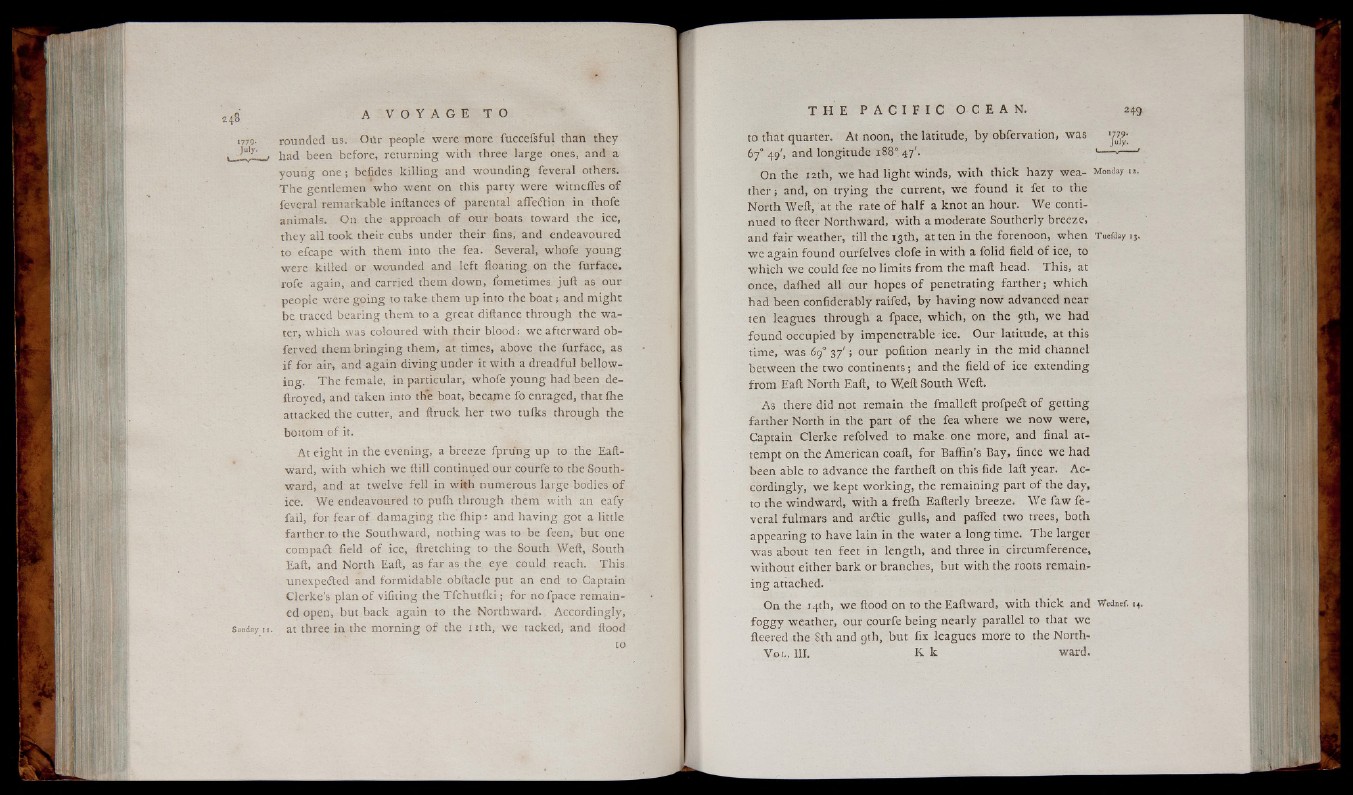
■779- rounded us. Our people were more fuccefsful than they
v July' . had been before, returning with three large ones, and a
yo u n g o n e ; befides k illin g and w o u n d in g . feveral others.
T h e gentlemen who went on this party were witncffes o f
feveral remarkable inftances o f parental affeftion in thofe
animals. On the approach o f our boats toward the ice,
they all took their cubs under their fins, and endeavoured
to efcape with them into the fea. Several, whofe youn g
were killed or wounded and left floating on the furface,
rofe again, and carried them down, fometimes juft as our
people were go in g to take them up into the b o a t; and might
be. traced bearing them to a great diftance through the w a ter,
w hich was coloured with their blo od: we afterward ob-
ferved them bringing them, at times, above the furface, as
i f for air, and again diving under it with a dreadful bellowin
g. T h e female, in particular, whofe yo u n g had been de-
ftroyed, and taken into the boat, became fo enraged, that fhe
attacked the cutter, and ftruck her two tuiks through the
bottom o f it.
At e ight in the evening, a breeze fprung up to the Eaft-
ward, with which we ftill continued our courfe to the Southward,
and at twelve fell in with numerous large bodies o f
ice. We endeavoured to puih through them with an eafy
fail, for fear o f damaging the fhip: and ha vin g got a little
farther to the Southward, nothing was to be feen, but one
compaft field o f ice, ftretching to the South Weft, South
Eaft, and North Eaft, as far as the eye could reach. This,
unexpected and formidable obftacle put an end to Captain
Clerke’s plan o f viiiting the T f c h u t lk i; for nofpace remained
open, but back again to the Northward. Accordingly,
Sunday u. at three in the morning o f the n th , we tacked, and flood
to
to that quarter. At noon, the latitude, b y obfervation, was 'jc's-
67° 49', and longitude 1880 47'. 1---- ----- '
On the 12th, w e had ligh t winds, with thick h a zy wea- Monday 12.
th e r ; and, on trying the current, w e found it fet to the
North Weft, at the rate o f h a lf a knot an hour. We continued
to fleer Northward, with a moderate Southerly breeze,
and fair weather, till the 13th, at ten in the forenoon, when Tuefday 13.
we again found ourfelves clofe in with a folid field o f ice, to
w hich we could fee no limits from the mail head. This, at
once, daihed all our hopes o f penetrating far ther ; w hich
had been confiderably raifed, by h a vin g now advanced near
ten leagues through a fpace, which, on the 9th, w e had
found occupied by impenetrable ice. Our latitude, at this
time, was 69° 3 7 '; our pofition nearly in the mid channel
between the two continents; and the field o f ice extending
from Eaft North Eaft, to Weft South Weft.
As there did not remain the fmalleft profpect o f ge ttin g
farther North in the part o f the fea where w e now were,
Captain Clerke refolved to make one more, and final attempt
on the American coaft, for Baffin’s Bay, fince we had
been able to advance the fartheft on this fide laft year. Accordingly,
we kept workin g, the remaining part o f the day,
to the windward, with a freffi Eafterly breeze. We faw feveral
fulmars and a ritic gu lls, and palled two trees, both
appearing to have lain in the water a long time. T he larger
was about ten feet in length, and three in circumference,
without either bark or branches, but w ith the roots remainin
g attached.
On the 14th, we flood on to the Eaftward, with thick and Wednef, 14.
fo g g y weather, our courfe be in g nearly parallel to that we
fleered the 8th and 9th, but fix leagues more to the North-
V ol. Ill, K k ward.